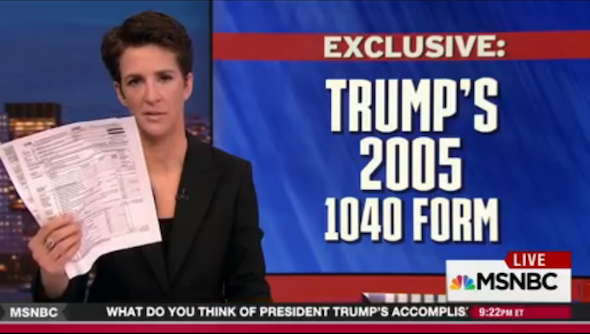At 7:36 p.m. Tuesday, Rachel Maddow tweeted, “BREAKING: We’ve got Trump tax returns. Tonight, 9pm ET. MSNBC. (Seriously),” sending the internet into a frenzy of theorizing. Did Maddow have Donald Trump’s tax returns or just one of the Trumps’ tax returns? Could this be it, the tax return that would bring down the Donald? If this was it, why wasn’t MSNBC cutting into its programming, instead of running a countdown clock to Maddow’s show? By 8:24, Maddow was tweeting that the tax return in question was Donald Trump’s 1040 from 2005. By 8:30, still half an hour before Maddow started airing, the White House had responded to the MSNBC report, saying that Trump had paid $38 million on income of $150 million that year. An hour later, about 20 minutes after The Rachel Maddow Show started, Maddow would confirm these numbers, turning her big scoop about Donald Trump’s long-missing tax returns into a cautionary tale about overhype. Rachel Maddow, you played yourself—and us too.
“It’s been a little bit of a hullabaloo around here this evening, I apologize for being flustered,” Maddow said at the top of the hour, before confirming that her show had copies of Donald Trump’s federal tax returns, obtained by the reporter David Cay Johnston, to share with her audience. “In just a second we’re going to show you exactly what it is we’ve got,” she said, before launching, instead, into a 20-minute monologue. Maddow seemed uncharacteristically nervous as she wended her way though what could kindly be described as context and which I am unkindly describing as word salad, a long meander that was difficult to follow even without the distracting promise of a revelatory tax return at its end.
The monologue started contextually enough, with a long-winded skewering of Trump’s refusal to share his tax returns that touched on Richard Nixon, the Clintons, and his unaudited tax forms, before veering off conspiratorially. “Whether or not you are a supporter of Donald Trump,” Maddow said, “It ought to give you pause that his explanations [for not releasing his tax returns] have never made any factual sense. … When you get an excuse from them that doesn’t make sense, you have to look for another reason. What’s the real explanation? Well, choose your own adventure.” She then launched into a long hypothetical about a particular Russian oligarch’s possible relationship to Trump that touched on Florida real estate, Deutsche Bank, and Preet Bharara that Trump’s tax returns—though not, as it would turn out, the ones she actually had—could conceivably clear up.
The longer Maddow went on, ever deeper into a conspiratorial thicket, the clearer it became that whatever tax returns Maddow had, they weren’t as juicy as the ones she was talking about. If she had anything that damning, she would have shared them from the start. TV is a ratings game, but an entire episode about highly damaging tax returns is just as likely to get you great ratings as milking the possibility that you have highly damaging tax returns and less likely to get you compared to Geraldo. Maddow even went so far as to hold the tax returns back until after the first commercial break, as if we were watching an episode of The Bachelor and not a matter of national importance—because we weren’t, in fact, watching a matter of national importance, just a cable news show trying to set a ratings record.
After the first break—at which point the tax returns were already available on the internet and glossed by the Daily Beast—Maddow was joined by Johnston, and she began by asking him how he knew Trump hadn’t sent the returns himself. Johnston said that he could have. A few hours after Maddow finished airing, this has become a popular conspiracy theory, simply because, if Donald Trump were to share any of his tax returns, the 2005 1040 seems like a good candidate. Trump paid taxes at a rate of around 4 percent, but because of the alternate minimum tax, he also paid an additional $31 million. The form revealed that, rather than not paying taxes and making no money, Trump paid $38 million on $150 million in income. Maddow promised to pull a sordid revelation out of a hat and instead plucked out … Trump’s credibility? Maddow was soon parsing, asking Johnston to explain that Trump is currently trying to do away with the AMT, which, unfair as it may be, still wouldn’t change the amount he paid in 2005.
As the show went on, it became clear that Maddow knew she didn’t quite have the scoop that had been promised. “What would we have to see, what would we hope to get in mail,” she asked Johnston, “if we were going to get to the real meat of Donald Trump’s foreign ties?”—i.e., what would be more meaningful than the tax form that we have? Speaking to Chris Hayes and Johnston, she said, “The story here to me is, a) we have obtained this [tax form], b) that this stuff is obtainable.” “BREAKING: Trump’s tax returns theoretically obtainable. Tonight, 9 p.m. ET. MSNBC. (Seriously)” does make for a less rousing tweet.
Trump’s tax returns, whatever information they happen to contain, constitute a major scoop. Maddow’s social media team ensured the highest possible ratings for that scoop. But if ever a story should have been delivered in a stentorian, fuddy-duddy, nonpartisan manner, this was it. In positioning it as a grand revelation, a vital step in comprehending Trump’s corruption, MSNBC created an exceedingly cynical spectacle. By playing into the network’s loyal liberal audience’s fantasy that there exists a Trump silver bullet, it instead delivered Trump a positive news cycle—the guy pays taxes! Who knew!—amidst the debacle of the American Health Care Act, along with more evidence that the media is aligned against him. The lesson? Don’t tell us you have news, just tell us the news.
Also in Slate:
